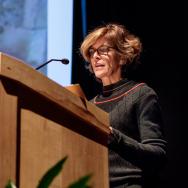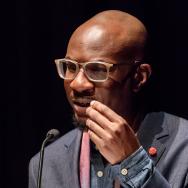The United States can become the world leader in virus response—if only the country were able to break the “laws of politics.”
That’s what Prof. Danielle Allen wrote in a recent Washington Post column, arguing for the creation of 30 “mega-labs” to test for COVID-19. A few days before that, the Harvard University political theorist helped publish “Roadmap to Pandemic Resilience,” a report describing the coronavirus as “a profound threat to our democracy, comparable to the Great Depression and World War II.”
Allen will further that conversation as part of the Randy L. and Melvin R. Berlin Family Lectures, hosted by the University of Chicago. Her lecture series, “Democracy in the Time of Coronavirus,” will begin May 12 and continue on May 13, 19 and 20. Each talk will be held virtually from 6 to 7:30 p.m. CDT. Registration for the series is free and open to the public.
Since 2014, the Berlin Family Lectures have showcased individuals who are making fundamental contributions to the arts, humanities and humanistic social sciences. Past speakers have included poet and photographer Teju Cole, Nobel laureate Mario Vargas Llosa and Harvard scholar Lawrence Lessig.
In this edited Q&A, Allen—a former UChicago faculty member—explains how combatting the COVID-19 pandemic requires a level of investment on par with being on a war footing. She also discusses how to mobilize the economy to fight the virus while keeping democracy, justice and the health care infrastructure intact.
In your writing, you have compared the COVID-19 pandemic to the attack on Pearl Harbor that launched America’s entry into World War II. Can you explain that analogy?
COVID-19 has introduced an existential threat. It has threatened to overwhelm our public health institutions. A collapse of our public health institutions would have called into question the legitimacy of our institutions generally, and that kind of failure of legitimacy would have provoked further instability. COVID-19 has introduced an equally existential threat with regard to our economy. Its impact is so devastating that it has the potential to undermine the stability of our institutions generally. We are in a fight with the virus to secure a society with stable institutions that are capable of delivering health, economic security, freedom and justice.
What makes this fight unique?
The intensity of this intellectual challenge has been immense. There has been so much to learn about the virus so quickly, which also has been part of its menace. First, there is the challenge of getting the science done and the work in political economy, and then there is the second challenge of disseminating all that rapid new learning about our invisible enemy to the public at large.
How can the U.S. prepare for the transition to a peacetime setting while preserving our political institutions and sustaining our constitutional democracy?
We need to mobilize our economy to deliver the tools we need to fight this pandemic. For example, we need a surge in health infrastructure and personnel. We need to increase our capacity to deliver testing-tracing-supported isolation. And we need to make sure that every tool we design has protections for civil liberties designed into it.
How can the U.S. keep its commitments to justice and ethical actions while waging this war?
We have to remember that we depend on one another—our mutual commitments to one another and to constitutional democracy. The material examples of these commitments are in the form of social supports, which will generate the solidarity necessary for us to get through this pandemic with measures that rely on voluntary compliance.
How has our government and health system responded to the overarching goal to minimize loss of life and care for the dying with dignity?
Our health professionals are heroes and have stepped into the breach.
Is there the political will to deploy full mobilization against COVID-19?
It is building, and we need to accelerate that process.
—Learn more about the Berlin Lectures at the Division of the Humanities website.

